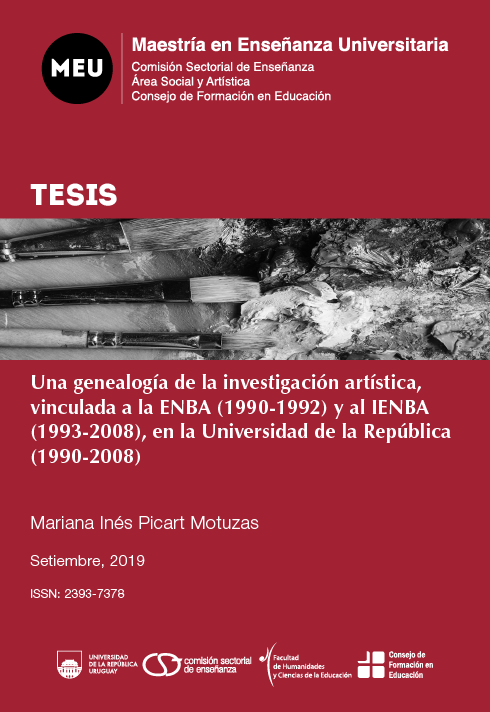Resumen
Está investigación se centró en visibilizar las discursos emergentes sobre investigación artística, vinculado a la ENBA (1990-1992) y al IENBA (1993-2008), en la Universidad de la República, entre los años 1990 y 2008, así como también identificar las condiciones y las tácticas y estrategias que hicieron posible la aparición de esos discursos. Para el análisis de los documentos utilizamos una perspectiva genealógica foucaultiana. A partir de la genealogía indagamos en las actas del CDC (1990-2008), de la Comisión Directiva de la IENBA (1990-1992), del Consejo del IENBA (1993-2008) y textos de autor (Bentancur, Yarzabal, Brovetto, Bianco y Sutz, etc.), pudiendo identificar, por un lado, las condiciones sociales, económicas y políticas que dieron lugar a la emergencia de ciertos objetos de discurso (Ciencia y Tecnología e investigación científica y tecnológica) en la Udelar y, por otro, acepciones y definiciones diversas sobre investigación artística (histórico-cultural, estética, transdisciplinaria, experimental, en materiales, artística, metodológica, teórica y académica, en artes plásticas y visuales, etc.). También, abordamos el escenario de pugnas discursivas en la Udelar, y el plan estratégico desplegado por los actores de la ENBA y el IENBA en el marco del CDC, visualizando que la Udelar apoya y legitima la investigación científica y la producción de conocimiento científico, y no reconoce formalmente la investigación artística como modo de investigar y producir conocimiento universitario. De todos modos, la temática de la investigación artística ingresó en los debates del CDC y, por ende, se hizo visible en el ámbito de la Udelar. Esto abrió, además, la posibilidad de pensar otros modos de hacer investigación en el territorio del arte (con una diversidad de perfiles), desgajados de la tradición de la ciencia. Los hallazgos obtenidos a partir de esta investigación pueden aportar elementos significativos para la discusión e intercambio sobre investigación artística en el ámbito de la Udelar y en ámbitos universitarios internacionales, además de contribuir con las prácticas de enseñanza artística universitaria y con la propuesta de posgrado del IENBA. También puede estimular futuras investigaciones enmarcadas en la CSIC, en la Maestría en Arte y Cultura Visual o en otros ámbitos universitarios.
Palabras claves
genealogía, investigación artística, enseñanza universitaria
Abstract
This research focused on making visible the emerging discourses on artistic research, linked to the ENBA (1990-1992) and the IENBA (1993-2008), at the University of the Republic, between 1990 and 2008, as well as identifying the conditions and the tactics and strategies that made the appearance of those speeches possible. For the analysis of the documents we used the genealogical perspective of Foucault. Through of the genealogy, we investigate into the proceedings of the CDC (1990-2008), of the IENBA Board of Directors (1990-1992), of the IENBA Council (1993-2008) and author texts (Bentancur, Yarzabal, Brovetto, Bianco and Sutz, etc.), being able to identify, on the one hand, the social, economic and political conditions that gave rise to the emergence of certain discourse objects (Science and Technology and scientific and technological research) in the Udelar and, on the other , different meanings and definitions of artistic research (historicalcultural, aesthetic, transdisciplinary, experimental, in materials, artistic, methodological, theoretical and academic, in visual and plastic arts, etc.). Also, we analyze the scenario of discursive struggles in the Udelar, and the strategic plan deployed by the ENBA and IENBA actors within the framework of the CDC, visualizing that Udelar supports and legitimizes scientific research and the production of scientific knowledge, and does not formally recognize artistic research as a way of researching and producing university knowledge. Anyway, the theme of artistic research entered the debates of the CDC and, therefore, became visible in the field of Udelar. This also opened the possibility of thinking about other ways of doing research in the territory of art (with a diversity of profiles), detached from the tradition of science. The findings obtained from this research can provide significant elements for the discussion and exchange on artistic research in the field of Udelar and in international university fields, as well as contributing to university artistic teaching practices and the IENBA postgraduate proposal. It can also stimulate future research framed in the CSIC, in the Master of Arts and Visual Culture or in other university fields.
Keywords
genealogy, artistic research, university education
Director(es) de tesis
- Magalí Pastorino
Tribunal
- Fernando Miranda
- Aníbal Parodi
- Gregory Randall
Fecha de Aprobación
18/09/2019
Dictamen
Aprobado



